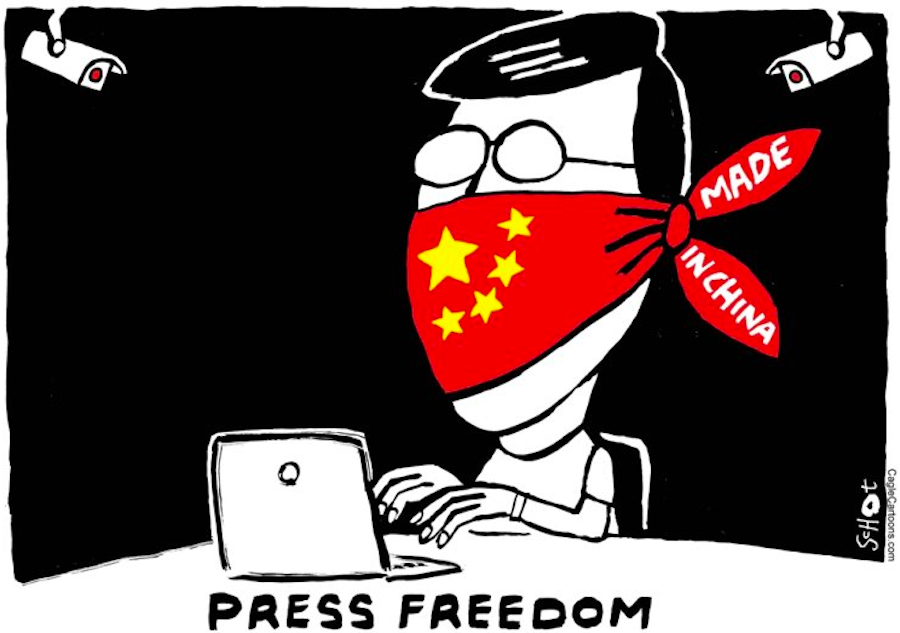By Claude Arpi
Returning recently from a visit to China, a friend of mine e-mailed me: “The Chinese are deeply upset with the French, they are really furious.”
Why? Because, the Olympic flame’s journey through the streets of Paris was not as smooth as in some other capitals; the Flame had to be extinguished 3 or 4 times (by the Chinese commandos/Men in Blue).
A few days later, young Chinese demonstrated in front of Carrefour supermarkets in China, asking their countrymen to boycott French goods, if France did not apologize immediately.
President Nicolas Sarkozy, who a few months ago was compared to Napoleon by one of his friends, must have remembered his illustrious predecessor’s words: “When China wakes up, the whole world will shake.”
Paris was so shaken that the President promptly sent three delegations to China. He even apologized for an incident involving a disabled Chinese athlete during the journey of the Flame through Paris. The protests “do not reflect the feelings of my countrymen toward the Chinese people” said the President.
To further appease Beijing, former French Prime Minister Jean Pierre Raffarin rushed to China to kowtow to the totalitarian regime. The former French Premier profusely apologized because the Paris Municipality has nominated the Dalai Lama an “Honorary Citizen of Paris.”
Chinese anger had once again been ‘rewarded.’ These instant rewards explain why the Chinese are constantly upset (or pretend to be).
Just last year, Beijing was extremely annoyed when the US House of Representative’s Speaker Nancy Pelosi awarded the Congressional Gold Medal to the Dalai Lama.
“The Chinese government strongly opposes the US Congress giving the Dalai Lama a so-called award,” fumed Chinese Foreign ministry spokesman Liu Jianchao, describing it as an “extremely erroneous arrangement.”
In June 2007, the Chinese were again saddened when Australian Prime Minister John Howard dared to meet the Tibetan Leader. Then in September, Beijing was offended when German Chancellor Angela Merkel decided to defy their threats and receive the Dalai Lama in Berlin.
A few days later, it was the chance of Alfred Gusenbauer, the Austrian Chancellor in Vienna to be at the receiving end of Chinese ire. And next, it was the turn of Stephen Harper, the Canadian Prime Minister to be slammed.
And more recently, Pelosi recidivated; she visited the Dalai Lama in Dharamsala. This time Beijing was really enraged.
Examples of Chinese ‘unhappiness’ with the West are endless. But this is not all.
An Indian acquaintance based in China wrote to me soon after the beginning of the unrest in Tibet, that all over China people were terribly infuriated with the Dalai Lama. They accused him of having masterminded the riots not only in the Tibetan capital, but also in the different parts of Tibet today administrated by the Sichuan, Yunnan, Gansu or Qinghai Provinces.
Wang Lequan, a member of the Politburo of the CCP in an interview on March 10 said: “No matter what nationality, no matter who it is, wreckers, separatists and terrorists will be smashed by us. There’s no doubt about that.”
Most of the ire was directly to the ‘Dalai’s clique’ or the Dalai Lama himself.
(I checked the definition of ‘clique’, a word used ad nauseam by Beijing: it is “an exclusive group of people who share common interests, views, purposes, patterns of behavior, or ethnicity.”)
Zhang Qingli, Party Chief in Tibet, went a step further: he called the Dalai Lama “a wolf in monk’s clothes, a devil with a human face” and added: “Those who do not love the motherland are not qualified to be human beings.”
Wen Jiabao, the Chinese Premier, told a press conference at the end of the National People’s Congress that Beijing had “ample facts and plenty of evidence to prove that the recent riot in Lhasa was organized, premeditated, masterminded and incited by the Dalai Lama clique”. He also personally attacked the Dalai Lama: “The constant claims made by the Dalai clique that they pursue not independence but peaceful dialogue are nothing but lies.”
And then a clique of old Tibetan collaborators was brought out of their comfortable residences in Beijing to express the anger of the Tibetan people. The first to shoot was the 98-year old Ngapo Ngawang Jigme, Vice-chairman of the 11th National Committee of the Chinese People’s Political Consultative Conference, who signed the infamous 17-Point Agreement in China in 1951.
In an exclusive interview with Xinhua, Ngabo said the Dalai Lama “was the wire-puller of the riots [which] broke out in Tibetan regions in China.”
Other collaborators also lashed out at the Dalai Lama. A Chinese stooge (or lackey in Marxist terminology) called Raidi, a former vice-chairman of the National People’s Congress, was outraged by the foreign news coverage of the riots. It is “ill motivated.” he told Xinhua News Agency.
Now a question arises, why should only the Chinese be upset, outraged, fuming, or angry?
In October 1950, Tibet was an independent nation, with its own government, its own foreign policy, its distinctive religion, language, script, and a separate currency. Until the People’s Liberation Army, led by a certain Deng Xiaoping, Political Commissioner for Western China, entered Tibet and started massacring the Tibetans. According to a Chinese source, the PLA ‘exterminated’ more than 5,700 Tibetan ‘soldiers’ and imprisoned more than 2,000 in different areas of eastern Tibet between 7 and 25 October, 1950.
The Tibetan Government-in-exile in Dharamsala has documented the ‘collaterals’ of the so-called ‘liberation’: “Accounts of massacres, tortures and killings, bombardment of monasteries, extermination of whole nomad camps are well documented. Quite a number of these reports have been also documented by the International Commission of Jurists’ 1960 report on Tibet.”
It has been estimated that more than 10,000 Tibetans were killed within three days in Lhasa in March 1959. According to a secret 1960 PLA Tibet Military District Political Department report, between March 1959 and October 1960, 87,000 Tibetans were killed in Central Tibet alone.
Several years ago, the Dalai Lama’s Administration had compiled dreadful figures: 1.2 million Tibetans have died between 1949 and 1979 due to the Chinese presence on the Tibetan plateau.
According to Dharamsala, 173,221 Tibetans perished after being tortured in prison, 156,758 were executed, 432,705 died fighting, 342,970 starved to death, 9,002 committed suicide, while 92,731 lost their lives through ‘struggle sessions’ (during which an accused is supposed to admit his/her crime against the Party and the ‘People’ while he is publicly tortured).
Further, while 6,259 monasteries and nunneries were functioning in Tibet before 1959, only 8 remained intact in 1976. Out of 592,558 monks and nuns of different sects and schools, 250,000 were forcibly disrobed while over 110,000 were tortured.
Even if this investigation has not been done in the most rigorously scientific conditions due to the difficulty of access to information inside Tibet, it gives a broad indication of what has happened in Tibet.
Having myself seen the files, I can vouch that a great effort has been made by Dharamsala to arrive at the correct figures.
Would it not be normal for the Tibetans to be upset with the Chinese? Yet today only Beijing has the right to be upset.
There are countless examples of the sufferings of the Tibetans. Though working closely with the Communist Government, the 10th Panchen Lama was so disturbed by the situation inside Tibet that in January 1989 he openly declared in Shigatse: “The Chinese rule in Tibet had brought more destruction than benefit to the Tibetan people.”
On January 28, 1989, four days after delivering this historic speech (witnessed by President Hu Jintao), the Panchen Lama died at his Tashilhunpo Monastery.The mysterious nature of his death generated a lot of speculation. Was his death natural? Or had he upset the Chinese too much? Was it not distressing for the Tibetan people to lose such a courageous leader?
Today the Chinese are bringing millions of Han migrants to Tibet, reducing the local population to a small minority. All decisions are taken by Han cadres. The Panchen Lama in 1987 had already declared: “It is not that we are not able to exercise power, but that we have not been given any power. A servant is naked not because he does not want to wear clothes, but because his master has not given him any clothes.”
Today, Tibet’s minerals and natural resources are systematically looted by the Central power in Beijing to help run the economy of the ‘motherland.’ The railway line brought 4 million Han Chinese to Tibet in 2007. Is that not distressing?
And what about the Communist government taking over the discovery and recognition of reincarnated Lamas (the Panchen Lama in particular)?
But second-class citizens have no right to be irritated or unhappy!
Why could Raffarin have not asked the Chinese to apologize for having illegally taken over law and order in Paris (the day the Flame came) and for the Blue Men’s misbehavior with several French athletes and the media?
What about India? Is it not time for the Government to state publicly that hundred of millions of Indians are still deeply hurt by the treacherous attack on India in October 1962?
Indians are deeply outraged when the Chinese Ambassador claims that large chunks of Indian territory belong to China. They are also distressed when Chinese troops intrude shamelessly in Arunachal Pradesh or in Ladakh. Why is Beijing always requesting others to apologize when it never does so?
Is it not time to reverse the roles and tell Beijing that we are upset?
Is it not the time for the Dalai Lama to teach the Chinese leadership some Buddhist values such as equanimity of mind and compassion? It would be helpful if we want to live in a more peaceful world.
PS: Both the Tibet supporters and the Chinese Government are extremely upset: they just discovered that thousands of Tibetan flags used during the demonstrations in Europe are made in Guangdong Province (South China)!
Claude Arpi
 Born in Angoulême, France, Claude Arpi’s real quest began 36 years ago with a journey to the Himalayas. Since then he has been an enthusiastic student of the history of Tibet, China and the subcontinent. He is the author of numerous English and French books including. His forthcoming book, ‘Tibet: the lost Frontier’ (Lancers Publishers) will be released soon.
Born in Angoulême, France, Claude Arpi’s real quest began 36 years ago with a journey to the Himalayas. Since then he has been an enthusiastic student of the history of Tibet, China and the subcontinent. He is the author of numerous English and French books including. His forthcoming book, ‘Tibet: the lost Frontier’ (Lancers Publishers) will be released soon.
The views expressed in the article are the author’s and not of Sify.com









